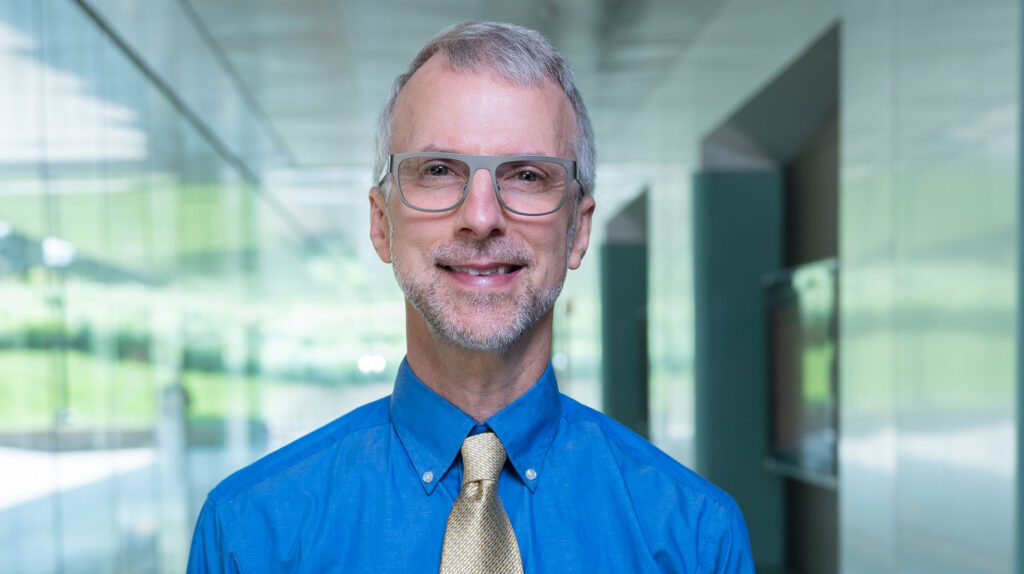Jeff Fessler named ISMRM Senior Fellow for outstanding work in image reconstruction

Jeff Fessler has been named an International Society for Magnetic Resonance in Medicine (ISMRM) Senior Fellow. This award recognizes his accomplishments in magnetic resonance image (MRI) data processing, which have allowed medical practitioners to reduce scan time and create higher-quality images.
“Dr. Fessler’s research portfolio is nothing short of transformative, particularly in the field of image reconstruction algorithms. His innovative approaches to inverse problems and optimization techniques have revolutionized MRI, significantly improving both image quality and computational efficiency,” said Nicole Seiberlich, co-director of the Michigan Institute for Imaging Technology and Translation. “These advancements have had a profound impact on clinical practices, leading to more accurate diagnoses and better patient outcomes.”
Fessler is well-known for developing a method to use fast Fourier transforms on MRI data collected with a non-Cartesian sampling pattern, enabling improvements in both scanning to collect patient data and reconstructing the data into images. His research group and collaborators also developed methods to reduce the appearance of distortions or anomalies due to imperfections in the magnetic fields, allowing better visualization of the underlying anatomy. Fessler is also passionate about ensuring that his algorithms are available for other researchers and medical professionals to use. He created the Michigan Image Reconstruction Toolbox (MIRT) to give the MRI community easy access to his methods to process medical imaging data.
“The MIRT code repository has been downloaded thousands of times by researchers to advance their own work in medical imaging. With this, Dr. Fessler is the original embodiment of the Open MRI movement,” said Seiberlich.
While Fessler has spent the majority of the past 15 years focused on MRI, he hasn’t always worked with this medium. As a PhD student he focused on X-ray angiography, and then he worked on single photon emission computed tomography (SPECT) and positron emission tomography (PET) as a postdoctoral researcher. As an early-career faculty member, his group focused on low-dose X-ray computed tomography (CT). Later on, his work on MRI took form through collaborations with Douglas Noll, the Ann and Robert H. Lurie Professor of Biomedical Engineering, and other members of the U-M MRI community.
“This award means a lot to me because most of my peers as a doctoral student advised by Al Macovski were working on MRI at that time, whereas I didn’t start focusing on MRI until many years later—so I felt a little bit like an outsider,” said Fessler, the William L. Root Distinguished University Professor of EECS. “Finally, I get to join the illustrious and large group of my PhD advisor’s former students who are ISMRM Senior Fellows.”
Fessler adds this distinguished title to a long list of research honors and awards, including the U-M Distinguished Faculty Award, CoE Steven Attwood Award, IEEE EMBS Technical Achievement Award, and Edward J. Hoffman Medical Imaging Scientist Award. He is also a Fellow of the Institute of Electrical and Electronics Engineers (IEEE) and the American Institute for Medical and Biological Engineering (AIMBE). His students and trainees have also earned many accolades for their research under his supervision.
Fessler holds 15 patents and most recently co-authored the textbook Linear Algebra for Data Science, Machine Learning, and Signal Processing. He is also a committed and impactful teacher, as evidenced by his receipt of the U-M Henry Russel Award, U-M Rackham Distinguished Graduate Mentor Award, Michigan Engineering Education Excellence Award, and Biomedical Engineering Teaching Excellence Award. He has received the HKN Professor of the Year Award three times, through student voting.
Fessler is currently serving as interim chair of Electrical and Computer Engineering. In addition to his home appointment in Electrical Engineering and Computer Science, he is a professor of Biomedical Engineering and of Radiology.
 MENU
MENU 
